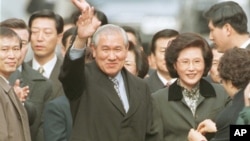South Korea’s lawmakers are deliberating a bill meant to increase the scope of, and put stronger penalties into, the Asian nation’s anti-corruption laws.
The measure, proposed two years ago by Kim Young-ran, then the head of South Korea’s Anti-Corruption and Civil Rights Commission, is meant to shut down corrupt activities that do not directly involve reciprocity - receiving money in return for political and other favors.
The bill, officially introduced in August, came on the heels of the July release of a government report on the sinking in April of a passenger ferry that killed 304 people. At least 11 officials face possible prosecution on corruption charges in connection with the accident.
South Korea’s official Yonhap news agency said then that “the regional Incheon port administration unjustly gave license to the illegally extended ferry while the government-commissioned ship safety inspection body, Korean Register of Shipping, failed to carry out proper safety checkups.”
Prison, fines
The new anti-corruption bill would enable courts to sentence public officials convicted of corruption with up to three years in prison and fines of 3 million won - roughly $28,000.
The proposed law sets up stronger controls on activities that could result in conflicts of interest, along with setting fines for kickbacks at up to five times the amount the official received - even if the payment is for something not directly connected to their job and even if they did not provide political favors in return.
The bill also covers kickbacks paid to family members of government officials, and closes the "loophole" of using a middle man to convey a bribe.
South Korea was rocked in 1996, when two former presidents, Chun Doo- hwan and Roh Tae-woo, were convicted of taking hundreds of millions of dollars in bribes during their terms in office. Convicted with them were several executives of major Korean conglomerates who made the bribes in return for political favors and government contracts.
This scandal helped propel the passage of anti-corruption laws.
But analysts say that the proposed law does not go far enough and has loopholes allowing bribe-takers to get off without prosecution.
South Korea President Park Geun-hye is pushing the National Assembly to approve the new measure quickly, calling the situation among some high-level government officials “bureaucratic mafia.”
Park has also proposed measures to shut down the so-called “revolving door” through which officials of government regulatory bodies leave and join the very companies that were under their review.
South Korea, which is ranked 46th among 177 nations in Transparency International’s 2013 Corruption Perceptions Index, is seen by some analysts as having a pervasive system for conveying favors in return for monetary consideration, along with lax enforcement of existing anti-corruption laws.
Because of that, they say this new measure is needed.
“The bribery culture based on family networks, school connections and regionalism is so well-developed here that it is hard for civil servants to resist requests for illicit favors,” Lee Yong-sup, head of the Korea Institute of the Future, told The Financial Times.
He added, “The stronger punishment against bribery, regardless of reciprocity, will make it easier for civil servants to say ‘no’ to such requests.”
Transparency of government
The World Economic Forum’s 2013-2014 Global Competitiveness Report said South Korea came in at 133rd out of 144 nations surveyed, regarding the transparency of its government processes. It also came in 97th for public trust in politicians.
In an interview with VOA in Seoul, Yi Ok-nam, the director of Political Affairs for the good-governance group Citizens United for a Better Society, said, “In cases of malfeasance in office, current criminal law regulates just traditional corruption activities of civil servants, and limits controlling new types of corruption such as conflicts of interest.”
Yi added, “In the [current] code of conduct of civil servants, such things as implementation of integrity are defined, but the content [of the code] is not compulsive but declamatory, so punishment regulations are still inadequate.”
While reformers clamor for the new bill’s passage, some observers say it may need to be made less aggressive and punitive to get past lawmakers who may themselves be in the pockets of those that new anti-corruption measures are meant to curb.
VOA Seoul producer Youmi Kim contributed to this report.





